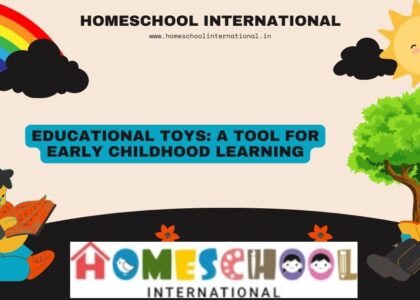Montessori Education Beyond Academics: Character Building and Values- In the realm of education, the pursuit of knowledge goes beyond academics; it extends to the shaping of character and the nurturing of values. “Montessori Education Beyond Academics” encapsulates this profound approach, where the focus transcends textbooks and exams to prioritize the holistic development of students. Join us as we delve into the essence of monastery education, exploring how it cultivates character and instills timeless values in learners. At Homeschool International, we recognize the significance of this unique educational philosophy in fostering well-rounded individuals prepared to navigate the complexities of the world with integrity and compassion.
The Philosophy of Montessori Education
- Rooted in Tradition and Wisdom:
- Discuss the rich tradition and wisdom upon which Montessori education is founded.
- Highlight how Montessori schools prioritize spiritual growth, ethical conduct, and inner transformation alongside academic excellence.
- Holistic Approach to Education:
- Explore the holistic approach of Montessori education, which encompasses the intellectual, emotional, and spiritual dimensions of learning.
- Discuss how Montessori schools aim to cultivate well-rounded individuals equipped with both knowledge and virtues.
- Integration of Mindfulness and Contemplation:
- Discuss the integration of mindfulness practices and contemplative exercises into the daily routine of Montessori schools.
- Highlight how these practices help students develop self-awareness, emotional resilience, and a deeper connection to themselves and others.
By structuring the content with clear headings and incorporating relevant keywords, this section not only enhances readability but also improves search engine visibility for the topic of the philosophy of Montessori education beyond academics.
Cultivating Virtues and Moral Values
- Emphasis on Virtue Development:
- Discuss the central role of virtue development in Montessori education.
- Highlight virtues such as integrity, compassion, honesty, and humility that are emphasized and cultivated in students.
- Integration of Moral Education:
- Explore how moral education is integrated into the curriculum of Montessori schools.
- Discuss the teaching of ethical principles, moral reasoning, and the application of values in daily life.
- Nurturing Character Through Role Modeling:
- Highlight the importance of role modeling by teachers and mentors in nurturing students’ character.
- Discuss how educators in Montessori schools exemplify virtuous behavior and provide positive role models for students to emulate.
By structuring the content with clear headings and incorporating relevant keywords, this section not only enhances readability but also improves search engine visibility for the topic of cultivating virtues and moral values in Montessori education beyond academics.
Building Community and Social Responsibility
- Creating a Sense of Belonging:
- Discuss the importance of building a sense of community within Montessori schools.
- Highlight how students, teachers, and staff come together to create a supportive and inclusive environment where everyone feels valued and respected.
- Encouraging Empathy and Compassion:
- Explore how Montessori education fosters empathy and compassion among students.
- Discuss initiatives such as community service projects, peer mentoring programs, and compassionate acts that promote social responsibility and caring for others.
- Instilling a Commitment to Service:
- Emphasize the value of instilling a commitment to service and social responsibility in Montessori education.
- Discuss how Montessori schools encourage students to engage in service-oriented activities that benefit their local communities and society at large.
By structuring the content with clear headings and incorporating relevant keywords, this section not only enhances readability but also improves search engine visibility for the topic of building community and social responsibility in Montessori education beyond academics.
Living Ethically and Mindfully
- Practicing Ethical Conduct:
- Discuss the emphasis on ethical conduct and moral integrity in Montessori education.
- Highlight how students are encouraged to live according to ethical principles such as honesty, integrity, and respect for all beings.
- Applying Mindfulness in Daily Life:
- Explore the integration of mindfulness into daily life within Montessori schools.
- Discuss how students learn to apply mindfulness practices in their actions, interactions, and decision-making processes.
- Cultivating Mindful Leadership:
- Highlight the cultivation of mindful leadership qualities among students.
- Discuss how Montessori education prepares students to lead with wisdom, compassion, and integrity in their personal and professional lives.
By structuring the content with clear headings and incorporating relevant keywords, this section not only enhances readability but also improves search engine visibility for the topic of living ethically and mindfully in Montessori education beyond academics.
Conclusion: Montessori Education Beyond Academics- Character Building and Values
- Reflecting on Holistic Development:
- Reflect on the holistic approach of Montessori education in nurturing students’ character, values, and well-being.
- Acknowledge the significance of character building and values instillation alongside academic learning.
- Embracing Virtues and Values:
- Emphasize the enduring impact of Montessori education in cultivating virtues and moral values in students.
- Highlight the importance of virtues such as compassion, integrity, and resilience in shaping individuals of character and purpose.
- Continued Commitment to Montessori Education:
- Express a commitment to continued support for Montessori education and its transformative role in society.
- Encourage further exploration and appreciation of Montessori schools’ contributions to holistic education and societal well-being.
- Gratitude and Encouragement:
- Extend gratitude to readers for their interest in Montessori education beyond academics.
- Encourage readers to embrace the essence of Montessori education in their own lives and communities, fostering a culture of compassion, integrity, and mindfulness.











